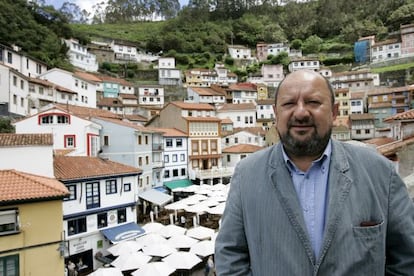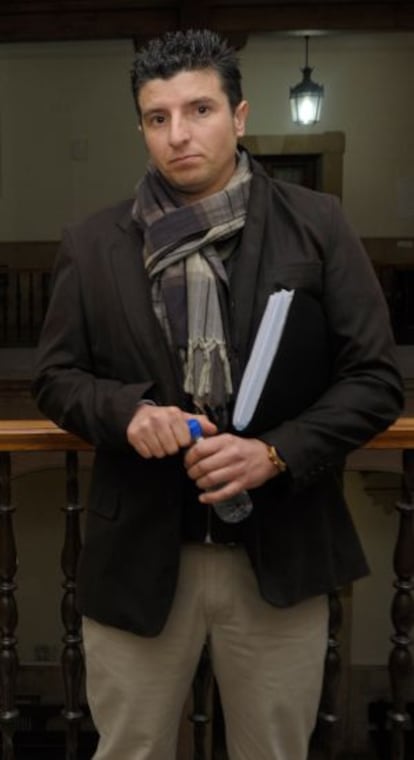Asturian pork barrel: ex-mayor accused of creating personal fiefdom
North coast town of Cudillero has seen six different people head up its council over past two years

In the summer of 2008, the head of the municipal police in the picturesque coastal town of Cudillero, in Asturias on Spain's Atlantic coast, received a visit from representatives of local hotels, bars, and restaurants. They said that they wanted to pay Iván Flórez, who had been in the job for just three months, and his officers for the extra hours they had worked during the high season.
Perplexed, Flórez took the matter up with the Socialist Party mayor of the town, Francisco González, who said he would look into it. A year later, when Flórez discovered that the police were to be paid their summer overtime directly out of the pockets of local bars and restaurants, he reported the matter to the local court in Pravia.
Since then, González has stepped down from the mayoralty in a town which over the last two years has managed to have six council chiefs. Of eight Socialist Party councilors, only one remains, acting mayor Olga Fernández. The resignations and sackings over the last year in the Socialist Party means that it has been unable to field candidates for the post, and has only been able to hold on to power in Cudillero thanks to a commission set up to respect the results of the last municipal elections, in 2011, which apart from the eight councilors for the Socialists, awarded three to the Popular Party (PP), and two to the local grouping Asturian Forum.
In response to Flórez's accusations of corruption, Mayor González brought disciplinary charges against the head of police in September 2008, accusing him of requesting the alleged unofficial payments to the local police.
In May 2012, Flórez was acquitted by a local court of any wrongdoing. The Supreme Court looked into the matter, ruling that the mayor had concocted the whole story. It is now continuing an investigation into what measures to take against González.

After his acquittal, Flórez, 39, along with three bar owners in Cudillero, brought charges against the former mayor, accusing him of having created a "client network" to obtain money through illegal commissions levied on the owners of the beach bars that operate in the summer months in Cudillero.
By this time, González had become a member of the regional parliament in Asturias. But the regional court agreed to begin investigating the accusations. González ended up resigning his seat, and is now awaiting trial.
Carmen Pérez García de la Mata, the head of the PP in Cudillero, sums up Gonzalez's exit from regional politics after 21 years: "When things began to really stink, he realized that he had to go." García de la Mata accuses the former Socialist mayor of deliberately trying to gain immunity from investigation by joining the regional parliament.
But González argues that he has never benefitted personally from his position, and that Flórez agreed to the off-the-book payments for his team and accuses him of orchestrating a political campaign to remove him from office. At the same time, he accepts that he will likely be found guilty by the Supreme Court. "I don't stand a chance," he says.
Since González stood down, together with his deputy, Jesús Pallarés, in May 2012, Cudillero has had one mayor after another. The third in line for the job under Spain's closed-list system of candidates, Gabriel López, took over, lasting just six months in the job. At the end of December 2012, he stood down "for personal reasons," although local media say that he was put under pressure from González -- who in turn is accused of trying to run the town council from behind the scenes.
The local Socialist group then put forward Ignacio Fernández as mayor, even though he was not on the party's list of candidates in the 2011 elections. This has involved invoking legislation previously applied to the Basque Country, where under threat from terrorist group ETA, so many mayors and councilors stood down that the local parties had to find entirely new candidates.
Meanwhile, the Asturian Forum has brought the matter before the courts. The Constitutional Court says that Fernández could not take over, because he was not a candidate in the elections. The Socialist Party then proposed another councilor, Luis Fernández Garay, a former member of the merchant marine, and by his own admission a person lacking in any political experience. The Constitutional Court has since ruled him out. The Socialists have held onto power via a commission it controls, while the opposition is calling for new elections and pursuing the matter through the courts.
The opposition says that the root of the problem is González's continued attempts to hold on to power indirectly. At least one of the stand-in mayors, Victoria López, has stated in her resignation letter that she was doing so at the "insistence" of González. His opponents say that over his six terms in office, he provided jobs for 110 people, in a community of 5,600 people. He counters that he has never forced any of his successors to stand down, and accuses the PP of trying to win power against the wishes of the electorate.
Tu suscripción se está usando en otro dispositivo
¿Quieres añadir otro usuario a tu suscripción?
Si continúas leyendo en este dispositivo, no se podrá leer en el otro.
FlechaTu suscripción se está usando en otro dispositivo y solo puedes acceder a EL PAÍS desde un dispositivo a la vez.
Si quieres compartir tu cuenta, cambia tu suscripción a la modalidad Premium, así podrás añadir otro usuario. Cada uno accederá con su propia cuenta de email, lo que os permitirá personalizar vuestra experiencia en EL PAÍS.
¿Tienes una suscripción de empresa? Accede aquí para contratar más cuentas.
En el caso de no saber quién está usando tu cuenta, te recomendamos cambiar tu contraseña aquí.
Si decides continuar compartiendo tu cuenta, este mensaje se mostrará en tu dispositivo y en el de la otra persona que está usando tu cuenta de forma indefinida, afectando a tu experiencia de lectura. Puedes consultar aquí los términos y condiciones de la suscripción digital.









































